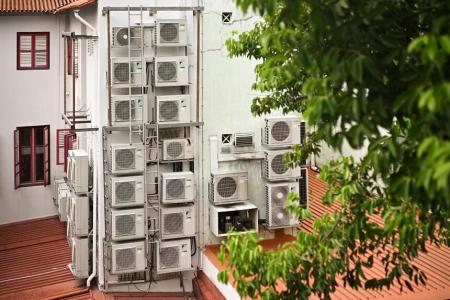Residents to be rewarded for cutting electricity usage during peak periods under new pilot
In a first-of-its kind initiative to get households to help manage the load on the electricity grid, residents in homes equipped with smart meters will be called upon to adjust their electricity usage during peak demand periods.
The initiative, called Residential Demand Response (R-DR), is targeted to start by the second half of 2024 and will tentatively involve about 1,000 households that have smart electricity meters provided by utilities firm SP Group, said the Energy Market Authority (EMA) on Tuesday.
These households will receive alerts from the SP app to temporarily cut down or defer their electricity usage during demand peaks in the power system. Once alerted, participating residents can postpone their usage of high energy-consuming appliances such as washing machines or dishwashers, or lower the temperature or turn off their air-conditioning.
Demand peaks in the power system refer to peaks in electricity consumption by consumers, which tend to occur during the afternoon and the hotter months of the year. For example, there was an 8 per cent increase in peak electricity demand from 7.3 gigawatts in February to 7.9 gigawatts in May 2023, which was hotter overall than February. Additionally, on May 13, Singapore’s temperature reached 37 deg C in Ang Mo Kio, a level not seen since 1983.
Electricity demand and supply must be managed because if many consumers are using electricity at the same time, there is less supply and prices typically go up. Peak periods can also strain the systems that deliver power.
Households that reduce their energy usage when alerted will receive financial incentives. While the initiative is tentatively planned to run for six months, other details such as the type of incentive will be revealed later as SP and EMA are finalising the programme.
Announcing the R-DR pilot at the Asia Clean Energy Summit on Tuesday, Manpower Minister and Second Minister for Trade and Industry Tan See Leng said that consumers have a role to play in ensuring that the grid remains fit for purpose, and that the importance of demand management is often overlooked when it comes to energy security.
EMA chief executive Ngiam Shih Chun added: “Consumers can play an important role in saving energy by reducing their usage, which can help reduce carbon emissions from the power system.”
EMA noted that the power system’s peak demand is forecast to increase at a compounded annual rate of up to 6.5 per cent over the next five years.
To balance electricity demand and supply, the initiative helps to keep the power system running smoothly and more efficiently by making use of demand-side resources in addition to supply-side ones from large conventional power plants, for instance, added the agency.
This programme for residents follows a similar initiative for commercial firms and industries. Under the two-year Demand Side Management Regulatory Sandbox, these commercial consumers receive payment as an incentive for reducing their electricity usage at certain times of the day.
These commercial consumers’ efforts led to the capacity of demand-side resources increasing by 1.5 times to around 100 megawatts, said EMA. And that led to energy buyers on the Singapore Wholesale Electricity Market paying $300 million less in total due to reduced wholesale electricity prices in the first half of 2023.
As at September, SP has installed more than 834,000 smart electricity meters across residential and non-residential areas. Households with those meters can use the SP app to monitor their electricity consumption.
Get The New Paper on your phone with the free TNP app. Download from the Apple App Store or Google Play Store now



